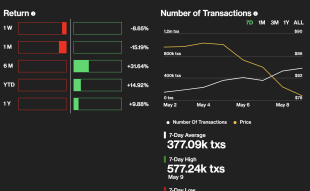Join Our Telegram channel to stay up to date on breaking news coverage
Grayscale Investments, a company specializing in managing cryptocurrency assets, has unveiled a fresh offshoot called Grayscale Funds Trust to supervise its growing array of publicly traded financial offerings.
In conjunction with this advancement, Grayscale has lodged a registration statement with the United States Securities and Exchange Commission (SEC) for three innovative exchange-traded funds (ETFs) concentrating on cryptocurrencies.
Grayscale Investments Unveils Grayscale Funds Trust for Growing Financial Offerings
Undeterred by prior challenges in the regulatory landscape, Grayscale exhibits unwavering resolve to introduce these cutting-edge funds, encompassing an Ethereum Futures ETF, a Global Bitcoin Composite ETF, and a Privacy ETF.
The central objective of the Global Bitcoin Composite ETF is to invest in exchange-traded products connected to Bitcoin, including Bitcoin mining companies, broadening the scope of exposure.
Similarly, the Ethereum futures ETF provides investors with an indirect avenue to participate in the potential future value of Ether through shares that reflect its price changes, offering a diverse approach to gaining exposure.
Shifting gears, the Grayscale Privacy ETF highlights its focus on enterprises dedicated to the progress of blockchain-based privacy technology.
It’s important to note that until the SEC approves the registration statement for Grayscale Funds Trust, none of the three ETFs will be available for public purchase. Grayscale’s announcement arrives amidst an ongoing dispute with the SEC regarding the conversion of its $17 billion Grayscale Bitcoin Trust into a spot Bitcoin ETF.
The asset manager has filed a lawsuit against the SEC, asserting that the regulator’s treatment of spot traded exchange-traded products and futures products is unjust. These new fund proposals from Grayscale, as revealed in regulatory filings, are pending court rulings and may not necessarily receive approval.
The Global Bitcoin Composite ETF is being referred to as a “semi-spot Bitcoin ETF” by Bloomberg Intelligence analyst Eric Balchunas. In addition to the proposed ETFs, Grayscale has formed the Grayscale Funds Trust, a statutory trust structure based in Delaware, which will accommodate the ETF products if they secure regulatory approval.
Grayscale intends to grow its business responsibly and enhance its clients’ investment experience, while eagerly awaiting the court’s decision regarding its conflict with the SEC.
The establishment of the Grayscale Funds Trust aligns with the company’s commitment to scaling its operations responsibly, as stated by Grayscale CEO Michael Sonnenshein. The goal is to establish a robust foundation that enables Grayscale to create and manage regulated and forward-looking investment products.
Grayscale Investments CEO Shares Concern Over SEC’s Stance on Safeguarding Investors
Grayscale Investments’ CEO, Michael Sonnenshein, recently expressed his perplexity over the United States Securities and Exchange Commission’s (SEC) reluctance to safeguard Grayscale investors and restore their true asset value to them.
During an interview on the podcast “What Bitcoin Did,” Sonnenshein discussed how the SEC’s denial of approval for the Grayscale Bitcoin Trust (GBTC) to become a spot Bitcoin exchange-traded fund (ETF) in June 2022 violated the administrative procedures act.
According to Sonnenshein, this act aims to prevent favoritism and arbitrary decision-making by regulators, suggesting that the SEC exhibited arbitrary behavior by approving Bitcoin Futures ETFs while rejecting GBTC’s conversion.
Sonnenshein highlighted that when the SEC began approving the first Bitcoin ETFs, Grayscale interpreted it as a signal that the regulator’s stance towards Bitcoin was changing.
He emphasized that if GBTC were approved as a spot Bitcoin ETF, approximately a couple billion dollars of capital would swiftly be returned to investors, as the fund’s net asset value (NAV) would align with its market price. Currently, GBTC trades at a discount to its NAV, but converting it to an ETF would eliminate this disparity, establishing an arbitrage mechanism.
Grayscale has taken legal action against the SEC and anticipates a decision challenging the initial application denial to be reached by the fall of 2023.
Sonnenshein underscored that Grayscale has over a million investor accounts and that investors worldwide rely on the firm to act in their best interests. He expressed his inability to comprehend why the SEC would not want to safeguard investors and restore their value.
Additionally, Sonnenshein acknowledged that Grayscale has a vested interest in the approval, and if the application to challenge the SEC’s decision is denied, the company might consider appealing the case to the U.S. Supreme Court.
The SEC’s denial of Grayscale’s request to convert its $12 billion Bitcoin Trust into a spot-based Bitcoin ETF in June 2022 was based on concerns about inadequate protection against fraud and manipulation. The agency had previously made similar findings in various applications for spot-based Bitcoin ETFs.
Sonnenshein argued that the SEC’s approach to crypto regulation and enforcement has hindered Bitcoin’s progress in the United States.
In an opinion piece published in The Wall Street Journal, he criticized the SEC’s one-dimensional approach of “regulation by enforcement” and highlighted the need for a balanced approach that fosters appropriate regulation while addressing bad actors.
The lack of action by the regulator to prevent these bad actors from entering the crypto industry has pushed American investors to utilize offshore crypto businesses with lesser oversight, jeopardizing their protection.
Grayscale’s legal battle with the SEC stems from the arbitrary denial of its plans to convert the Grayscale Bitcoin Trust to a spot ETF. Grayscale argues that the SEC’s treatment of spot-traded products differently from futures-traded products is arbitrary.
The crypto conglomerate Digital Currency Group (DCG), which owns Grayscale, is currently facing financial difficulties, with its subsidiary Genesis Trading being charged by the SEC for allegedly selling unregistered securities.
In response to Sonnenshein’s viewpoint, John Reed Stark, a former SEC chief, criticized the term “regulation by enforcement,” deeming it a misguided and baseless catchphrase. He emphasized that litigation and SEC enforcement are fundamental aspects of securities regulation.
Related Articles
Join Our Telegram channel to stay up to date on breaking news coverage


